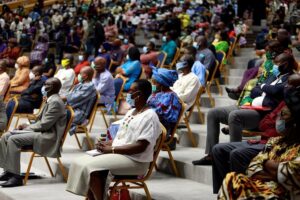Despite the mockery she receives, Pastor Mummy G.O. is an exception to the Nigerian Pentecostal norm as her strict theological model contrasts sharply with Pentecostalism’s current adhesion to the Prosperity Gospel.
Within the space of a few months, fifty-five-year-old evangelist Olufunmilayo Adebayo, popularly known as Mummy G.O., has gone from the relative obscurity of downscale Iyana-Ipaja, Lagos, to the most discussed subject in contemporary Nigerian Pentecostalism. The target of a blizzard of savage internet memes and unrelenting mockery, the founder and leader of the self-styled Rapture Proclaimer Evangelical Church of God (RAPEC) has been getting all the attention in a context where the leading—and mostly male—clerical figures dominate the news as a matter of course.
One reason for the sudden publicity is the severity of her theology and overall presentation, a sharp contrast to the gentrified aspect that Nigerian Pentecostalism has lately assumed. There is, to start with, a long list of types of clothing and fashion accessories that members of RAPEC and prospective worshippers, whether male or female, are forbidden from wearing. No beads, jeans, tattoos, make-up, phones, hair extensions; and absolutely no eyelashes. Service itself is a model of sonic austerity—no traditional talking drums, dancing, and certainly none of the razzle-dazzle (more on which presently) that has come to characterize the average Nigerian Pentecostal church service.
Mummy G.O. dresses the part too, her sartorial simplicity a world away from the flash and glamour of the modern-day Pentecostal pastor.
Another reason is the sheer outlandishness of some of her claims. In her telling, Mummy G.O. had led a charmed life before she found Christ, having improbably lived as a man in Egypt and died in a war, hobnobbed with Generals Olusegun Obasanjo and Ibrahim Babangida, while still managing to spend a good “990 years in the kingdom of darkness.”

Now, Nigerian Pentecostalism wouldn’t be what it is without such credulity-testing testimonies, essential as they are to the consolidation of pastoral hegemony. For instance, the doyen of the Nigerian theocratic class, Pastor Enoch Adeboye of the Redeemed Christian Church of God (RCCG) once told his congregation about an extraordinary cross-country trip in which he somehow drove his car from Ore in Ondo State to Lagos—a distance of 103 miles—on an empty tank. At the time, there were no electric cars. In November 2020, Pastor Johnson Suleman of the Omega Fire Ministries International revealed during a sermon the miraculous case of a church member who apparently teleported from France to Germany having skipped the normal inconvenience of boarding an airplane. Accounts of letters of appointment being received for jobs for which the attestors never applied and bank accounts being credited by mysterious benefactors are a staple of Pentecostal church testimonies. The difference between spending a millennium in the nether regions and changing physical location without transportation is therefore of degree, not of the essence.
Specifically for the spirit world in which Mummy G.O. apparently had such a long sojourn; not only do (Nigerian) Pentecostals generally take its physical existence for granted, narrations of tribulations in that abyss dominate early texts like Emmanuel Eni’s Delivered from the Powers of Darkness that set the moral tone for Nigerian Pentecostal revival.
Still, many have found Mummy G.O.’s testimonies a bridge too far.
Third, her emphasis on hell and hellfire, on a spectrum with her overall gravity, jars with the contrasting emphasis on heaven in Nigerian Pentecostalism. Although “memeification” has made it difficult to separate the truth from mischievous attributions, Mummy G.O. is on record declaring that drug pushers, soccer stars (apparently because the Antichrist will be introduced through the World Cup), comedians, and any youngster who demands a mobile phone as a birthday gift (the reason is not entirely clear) “are destined for hell.” Hell, a literal place of torment reserved for an assortment of arbitrarily determined spiritual outlaws, is the centerpiece of Mummy G.O.’s strict, anti-modernist theological system.
Hell used to be the center of Nigerian Pentecostalism’s moral galaxy, until the later turn towards Prosperity Gospel made all that gore and brimstone too painful to swallow. A renunciation of hell and embrace of heaven is the price of Nigerian Pentecostalism’s Faustian bargain for popular acceptance. On many church posters, Satan’s symbolic pair of horns have literally yielded to the dollar sign.
A few details aside, Mummy G.O. and Nigerian Pentecostals are cut from the same creedal cloth, raising the question why there is patent hostility towards her.
One possibility is her gender. While there are some notable female Pentecostal pastors in Nigeria, and while, historically, there have been strong female Christian leaders, they are few and far between, and the field remains largely and overwhelmingly male. Mummy G.O. has struck out on her own, much against the cultural expectation that women should stand beside (it used to be behind) their men. Notably, media reports about her are silent on the subject of a husband or male partner.
A second possibility is class. Iyana-Ipaja, where Mummy G.O. holds court among the socially excluded, is a world apart from, say, Victoria Island. Unlike the leading figures among the Nigerian theocratic class, she does not boast a prestigious educational or professional pedigree. Adeboye was a university academic. Tunde Bakare of The Citadel is a lawyer. Daniel Olukoya, founder of Mountain of Fire and Miracles Ministries (MFM) has a PhD in molecular genetics. David Oyedepo of the Living Faith Church Worldwide also has a PhD from an American university.
The tone of many of the memes suggests that not a few critics see her evident lack of polish as a cardinal sin. For observers of the Nigerian Pentecostal scene, Mummy G.O. is reminiscent of Temitope Balogun Joshua, the late founder of Synagogue, Church of All Nations (SCOAN) who, for all his accomplishments, also felt excluded on account of his limited education. But at least Joshua was male.
Furthermore, and as flagged above, Mummy G.O.’s personal austerity (instructively, she rarely smiles) and the harshness of her physical church pointedly contradict the latest trend in Nigerian Pentecostalism whereby the church has become a space of entertainment even as church service itself increasingly takes on aspects of theatrical performance. In its early days, Pentecostal success was marked by the assumption of spaces of entertainment like cinemas. In its triumphal state, Nigerian Pentecostalism has brought the reel world and the dramatic ethos back into the church, producing a unique constellation that I have described as “the theologico-theatrical.”
As Pentecostalism becomes, for want of a better word, a joke, the cleric and the comic have more or less fused into a single undistinguishable agent. Woli Agba (Ayobami Ajewole), Woli Arole (Bayegun Oluwatoyin), and Mc Ebenezer Aboki among others epitomize this unity. Michael Akpor of The Palace of God Bible Church, Warri, speaks and performs more like comedian “I Go Dye” (Francis Agoda) than a “traditional” clergyman.
The church service as pure theater is just one component. As they become converts and, in some notable examples, go on to mount the pulpit themselves, grandees from Nollywood, the country’s film industry, have helped along the fudging of the distinction between spirituality and spectacle.
The nascent genre of “gospel comedy” encapsulates this marriage of God and popular culture. Whether the pulpit is turned over to a comedian or entertainer to galvanize the congregation, or the pastor himself engages in self-parody, as Chukwuemeka Ohanaemere (aka Prophet Odumeje) of Holy Ghost Intervention and Deliverance Ministry, Onitsha, did when he wore to church a championship wrestling belt he had ostensibly won after vanquishing Satan at an international spiritual wrestling match, a spirit of levity reigns. Liturgy becomes leisure.
Mummy G.O.’s hard-knuckle spirituality stands as a repudiation of this trend.
Not unlike William Kumuyi of the Deeper Life Bible Church at its inception, Mummy G.O. appears to have embarked on a strategy of product differentiation in a crowded spiritual marketplace.
She has the attention. Whether that ultimately translates into a market share is a different question.
© Creative Commons: Some rights reserved.
Source: COUNCIL ON FOREIGN RELATIONS
https://any.peopleandpowermag.com/mummy-g-o-nigerias-much-derided-pentecostal-preacher-enunciates-a-powerful-social-critique/




